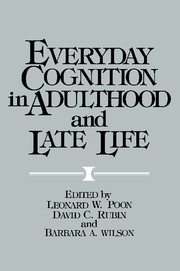Book contents
- Frontmatter
- Contents
- List of contributors
- Preface
- Part I Adult cognitive abilities in the laboratory and in real-life settings: Basic theoretical and methodological issues
- Part IA Systematic approaches to laboratory and real-world research
- Part IB Combining laboratory and real-world research
- Part II Cognition in adulthood and late life: Findings in real-life settings
- Part IIA Everyday cognitive abilities
- Part IIB Concomitant influences
- Part III Cognitive enhancement and aging: Clinical and educational applications
- Part IIIA Issues and perspectives
- Part IIIB Enhancement approaches
- Part IIIC Designing programs for cognitive rehabilitation
- 32 Designing memory-therapy programs
- 33 Management of memory problems in a hospital setting
- 34 Home-based cognitive rehabilitation with the elderly
- 35 Memory retraining: Everyday needs and future prospects
- Subject index
- Author index
32 - Designing memory-therapy programs
Published online by Cambridge University Press: 05 October 2013
- Frontmatter
- Contents
- List of contributors
- Preface
- Part I Adult cognitive abilities in the laboratory and in real-life settings: Basic theoretical and methodological issues
- Part IA Systematic approaches to laboratory and real-world research
- Part IB Combining laboratory and real-world research
- Part II Cognition in adulthood and late life: Findings in real-life settings
- Part IIA Everyday cognitive abilities
- Part IIB Concomitant influences
- Part III Cognitive enhancement and aging: Clinical and educational applications
- Part IIIA Issues and perspectives
- Part IIIB Enhancement approaches
- Part IIIC Designing programs for cognitive rehabilitation
- 32 Designing memory-therapy programs
- 33 Management of memory problems in a hospital setting
- 34 Home-based cognitive rehabilitation with the elderly
- 35 Memory retraining: Everyday needs and future prospects
- Subject index
- Author index
Summary
There are growing numbers of people whose lives have been extended through the application of increasingly sophisticated medicine and surgery, but whose memory functioning remains severely impaired. In many cases these impairments will be so bad that a normal life cannot be led; yet therapy, which might enable the severely memory-impaired person to return to the community, frequently is unobtainable. Many people who face such a predicament will consult doctors and other medical staff who, through lack of knowledge, believe that little or nothing can be done to alleviate some of the problems connected with memory impairment. At best, a psychological assessment of memory difficulties may be offered, but usually this is not followed up by advice on how to manage or, in some cases, overcome the problems that have been highlighted by the assessment.
A possible explanation for the existence of such a situation in the health services may have much to do with the lack of evidence to suggest that restoration of memory is possible. However, though I do not quarrel with the view that practically nothing can be done to restore memory functioning, I do want to claim emphatically that there is always something that can be done to improve the daily life of a memory-impaired person. At the same time as holding this view, I want to dissociate myself from the opinion that memory problems will disappear if the “right” drug or therapy is provided.
- Type
- Chapter
- Information
- Everyday Cognition in Adulthood and Late Life , pp. 615 - 638Publisher: Cambridge University PressPrint publication year: 1989
- 8
- Cited by



